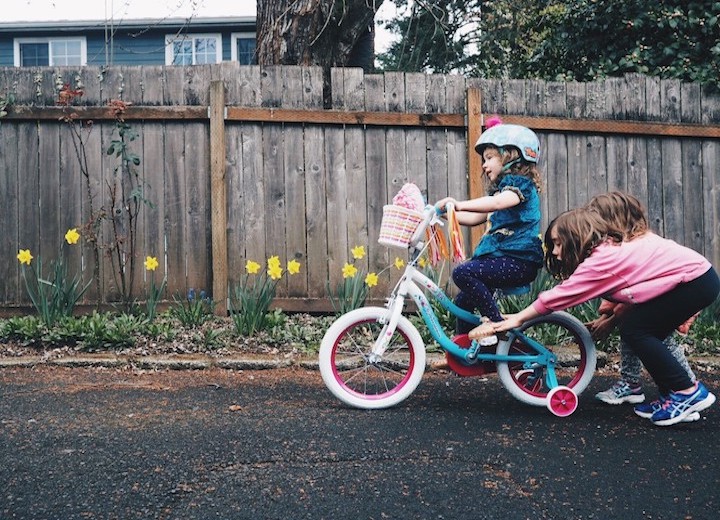Cringe when you hear the word “playdate?” You’re not the only one. Tons of parents have confessed, both in meetups with “real” friends, in online mom groups, and (I’m sure) to their therapists that play dates are just as anxiety-racking as blind dates. After all, you’re two strangers who know barely anything about each other (or everything about each other, depending on how the all-important pre-meeting Google/Facebook search went) but hope that things will work out. And unlike an actual date, you’ve got a few always unpredictable infants or toddlers running around by your feet.
But play dates can also be fun — for you. My first “play date” was when my infant daughter was 3 weeks old. Of course, the babies didn’t do anything, but now that my daughter is 3, I can say that she and the other child are best friends — and so are me and that mom.
While that scenario is ideal, even when your playdate doesn’t have a “happily ever after,” they can still provide valuable intel about neighborhood activities, schools, and the opportunity to swap parenting tips (or hilarious brunch anecdotes).
Here, some do’s and don’ts for making a playdate work.
Do keep it informal
The best playdates for me in my daughter’s first year of life were the Thursday night meetup organized by a friend in the neighborhood. She booked the community room in her building and suggested parents drop by between 4pm and 8pm. I met so many neighborhood moms, there was never pressure to stay or have a one on one conversation, and the timing meant that both stay at home and working parents could overlap. The group eventually disbanded when the babies were around one, due to people moving, schedules shifting, and general administrative laziness, but I’m actually re-introducing it this summer.
Don’t make it last forever
A drop-in playdate concept is one thing, but if you’re getting together with babies or toddlers, short and sweet is the best way to make sure it’s successful. I once hosted a playdate at 5pm, where the other mom didn’t leave until 10pm. Granted, both of us had a lax approach to bedtime for our then 18 months, but this was ridiculous. She didn’t get the hint when I pulled out the vacuum, so I literally had to show her to the door. Since then, I’ve learned it’s best to approach a newish playdate with your timeline up front. Saying something like, “I’d love to stop by for an hour,” makes expectations clear on both sides.
Do talk about more than parenting stuff
Playdates can bring up your own parental insecurities. I remember when my daughter was an infant feeling guilty or doubting my decision to send my daughter to daycare when I heard other moms talk about staying home or hiring a nanny. As all of us were finding our footing as parents, I found the type of friends were the ones I was able to get to know as more than just a mom. Ask about their weddings, their pre-baby lives, their craziest college experiences. Of course, you’ll always talk about sleep schedules and first foods at playdates, but remembering that you’re also trying to connect as friends can make the conversations less awkward.
Don’t try to change their minds
Don’t believe in sleep training? Don’t like a specific nursery school? Keep your opinions to yourself unless they ask. You won’t change their minds, and may just make your potential friend feel bad about him or herself. If you find yourself in a stalemate on parenting philosophies, just change the subject.
Do think about outside the box playdates
In our neighborhood, we have a beer garden with a large outdoor space that is family friendly until around 8pm. When my daughter was about a year old, we often chose to meet there instead of at someone’s house. There was plenty of space for our toddlers to, well, toddle, and the relaxed atmosphere made it easy for the parents to hang out, too.
Don’t force a playdate
The best playdates are the ones that evolve naturally. Trying to set something up can be overwhelming for everyone. If your toddler has made a little friend, instead of trying to set up a playdate, let the other parent know you’re planning to be at the local park at, say, 4pm on Sunday and see if they can meet you then. That way, you’re not disrupting your own plans.
Do understand “drop off” etiquette
We’re just getting toward the phase where “drop off” playdates are coming up in our social circle. At around 3 or 4, it’s fair to ask if the other parent is planning on the playdate to be a drop-off one, and it’s also fine to explain you’re more comfortable to be there, or suggest it’s hosted at your house. Jen, a mom of three in Kansas City, has also begun asking the other child’s parents if guns are kept in the house, who else may be interacting with her child, and prefers to have at least one playdate where she stays to talk to the parent. “Bringing up this stuff can feel awkward, but I’ve always found the other parent is relieved to have this conversation, too,” she says. If something is important to you, bring it up!
Don’t forget to reciprocate
Drop off playdates are like free babysitting — so make sure you offer the same courtesy to the other parent! If their schedule or home setup makes it logistically easier for them to host, consider returning the favor in other ways, like by swinging by the play date with coffees or lunch for the other parent, offering to chauffeur the other family’s kids to a school function, or otherwise being mindful of their time and hospitality
Do remember: kids will fight!
My toddler is in a “mine” phase — and I’ve found that a lot of playdate time is spent playing referee (or mediator) between toddlers. Knowing that toddlers may not get along, and that’s okay, can be essential to keeping playdate sanity.
Don’t hold grudges
Kids change so fast that a toddler who threw tantrums six months ago could be an entirely different kid now. The same goes for parents! The organic-only dad may have chilled out; the “no screen time” mom may no longer be as invested in espousing her reasons to others. The point of all of this: Even a play date that didn’t go great once doesn’t mean it’s not worth it to try it again, especially if your kids seem to connect.
Don’t put pressure on yourself (or your kid!)
While I may be a playdate evangelist, I also don’t think it’s a huge deal if you don’t have a regular rotation of them in your life. I live in a neighborhood full of families, and nearby parks, as well as the communal backyards and pools that are part of the amenity package in many of the high-rise apartment complexes in our neighborhood, means that it’s been pretty easy to meet families. But people are busy, and work and family obligations already may feel like they’re taking up 28 hours of your day. If that’s your situation, don’t sweat it. But if you do have a free Saturday afternoon and get an invite, don’t say no just because you don’t “do” playdates. It’s not like you’re being asked to run a marathon or play a round of golf. No knowledge or experience is required!
Embrace the rite of passage
Playdate rules really come from a lot of experience. Also, trial and error. I’ve wasted entire Sundays for a playdate that ended up falling through because one of the kids was napping or cranky or suddenly ran a fever. I’ve had playdates where I’ve scrambled for things to talk about with the parents, playdates where I had to drag my daughter, screaming, home, and playdates where I’ve found families who I’ve connected with not only as “parent friends” but as friends.
Right now, my personal rules for playdates are pretty clear: I don’t plan a weekend playdate unless it’s a barbeque that involves a few families, because that’s fun for me. I schedule a playdate at my house the day before a housekeeper comes. I will straight up say a playdate is over when I’m tired. But now that the era of parent and kid play dates is closing, and my daughter will likely be going to more and more playdates without me, I’m so glad that I went to so, so many when my daughter was little. While she had fun, I can now see they weren’t just for her, they were also for me. I loved meeting so many families in our neighborhood, and now feel like we’re part of this great community with so many parents I can call friends. So, yes, they are awkward. They can be excruciating (at times). But in my experience, they’re essential. Even when they’re awkward, you’re still doing something with your child, and that’s worth something (especially when you have a toddler you need to tire out!)
Anna Davies is an editor at Haven Life. She has written for The New York Times, New York Magazine, Refinery29, Glamour, Elle, and others, and has published 13 young adult novels. She lives in Jersey City, NJ, with her family and loves traveling, running, and trying to find the best cold brew coffee in town.






